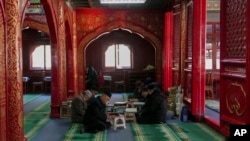For Muslims around the world, Ramadan is a time for fasting, praying, charity work and providing community assistance. In China, as Muslims mark the holiday from March 10 to April 9, restrictions in some areas where large populations of Hui Muslims live have triggered heated discussions.
Hui Muslims are China’s second-largest Muslim population following the Turkic-speaking Uyghurs, with more than 10 million people.
A day after the religious holiday began, the Yuxi Municipal Government in southwestern Yunnan Province issued an emergency notice. According to the notice, party committees, governments and education departments at all levels were required to comprehensively investigate and strictly prohibit Muslim members of the Communist Party of China (CCP) and minors from participating in religious activities such as fasting.
Although the document states that fasting is one of the religious practices of Islam, it adds that to maintain political discipline, CCP members should be firm Marxist atheists and are not allowed to participate in religious activities.
The document emphasizes the principle of separation of education and religion, noting that schools and training institutions are strictly prohibited from providing services for minors to participate in religious activities. It also says individuals or organizations that violate the restrictions will be severely punished.
"Children are not allowed to fast in schools now, and Yuxi has begun to implement the requirements of this notice," a Muslim whose last name is Na told VOA Mandarin. Na did not give his full name because of security concerns.
"I went to Tonghai two days ago and talked with the locals. The mosque hadn't been investigated,” Na said. “Only schools had told children not to fast and what punishment they would face if they did. They were also asked to monitor who in their families was fasting.”
Yuxi’s public primary schools also conducted a questionnaire for lower-grade students, asking whether anyone in the family fasted or prayed.
A Muslim member of the CCP in Yunnan, whose last name is Wang, said the local government has tightened its grip since Ramadan started. In the previous party meetings he attended, leaders emphasized that CCP members shouldn't pray.
Ruslan Yusupov, a Society for the Humanities fellow at Cornell University who studies Islam in China, told VOA Mandarin that the notice is related to a previous national document issued by the Islamic Association of China. It also indicates that the Chinese government will move forward with further restrictions on religious freedom across the country.
"Before Xi Jinping's tenure, fasting was seen as an ethnic custom and was allowed with some freedom,” he said. “Even among CCP members and officials, many fasted. Under Xi, it's deemed a religious activity and is increasingly restricted, showing the government's control and suppression of religions using unofficial measures."
Mohammed Alsudairi, an Islamic studies scholar at the Australian National University, worries the implementation of the notice may lead to greater oppression and exclusion of Muslim communities, aggravate social tensions and be detrimental to the harmony and stability of Chinese society.
"The notice emphasizes that members of the CCP must firm their atheistic stance and are strictly prohibited from participating in religious activities,” Alsudairi said. “This shows that the Chinese government is trying to bring religious management into the scope of political control and strengthen the politicized management of religion."
The Yuxi government's move is not an isolated incident. Zhoukou, Luoyang, Zhumadian, Jiaozuo and other places in Henan Province have all received notices that minors are prohibited from entering mosques. Some mosques have posted signs prohibiting minors from entering at the door.
A Muslim government worker in Gansu Province said mosques there have recently been restricted and are required to retain only half of their existing students. The remaining students are asked to return home.
"The rule that CCP members are not allowed to enter mosques to attend prayers has been in place for many years,” the worker said. “Gansu Province has not issued relevant documents requiring CCP members not to fast. In sharp contrast, I heard that in Xinjiang, during the Muslim holy month of Ramadan, lunch is provided to ensure Muslims can eat under supervision."
Last November, Human Rights Watch reported that after damaging or destroying two-thirds of the mosques in Xinjiang where Uyghur and other Turkic Muslims live, Chinese authorities moved to significantly reduce the number of mosques in provinces such as Ningxia and Gansu, where large populations of Hui Muslims live.
Ai Yundong, chief of the Ethnic Section of the Ethnic and Religious Affairs Bureau of Yuxi City, Yunnan Province, told VOA Mandarin that the main purpose of the document is to ensure that religious activities are carried out within the legal framework and do not affect social stability and educational order.
"The purpose of this document is to maintain the political discipline of CCP members and minors, strictly implement national policies and regulations on religious affairs, and ensure religious activities are carried out within the legal framework and do not affect social stability and educational order," Ai said.
He said fasting, as an Islamic religious activity, falls within the scope of freedom of religious belief, but in public places, strict political neutrality must be maintained and minors must not be forced or facilitated to participate in religious activities.
He said the document aims to strengthen the education and guidance of CCP members and minors, safeguard their political stance, protect minors' legitimate rights and interests, and prevent them from being adversely affected or infiltrated by religious extremism.
VOA reached out to the Islamic Association of Yunnan Province for comment and was told by a staff member there that he was not aware of the notice. VOA also reached out to the Islamic Association of Yuxi City several times, but no one answered the phone.
Adrianna Zhang contributed to this report.




